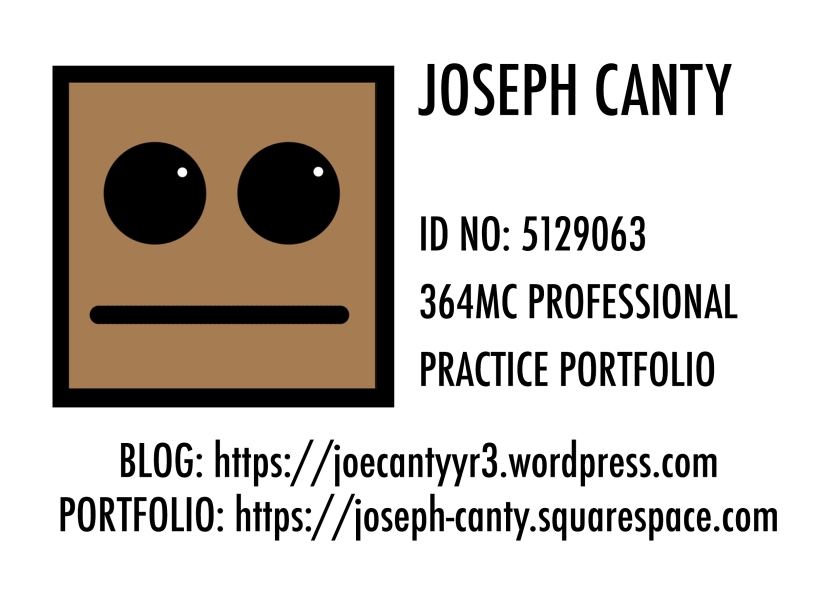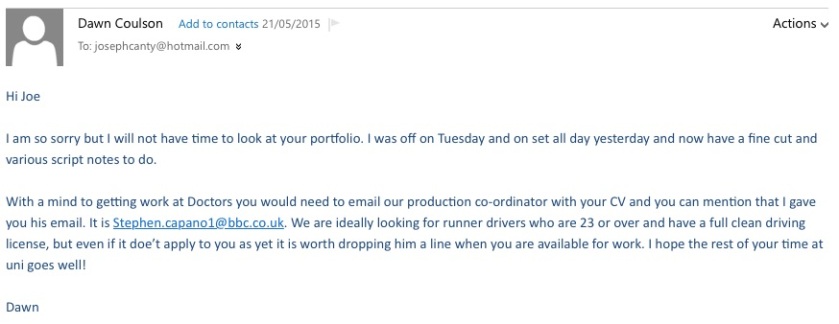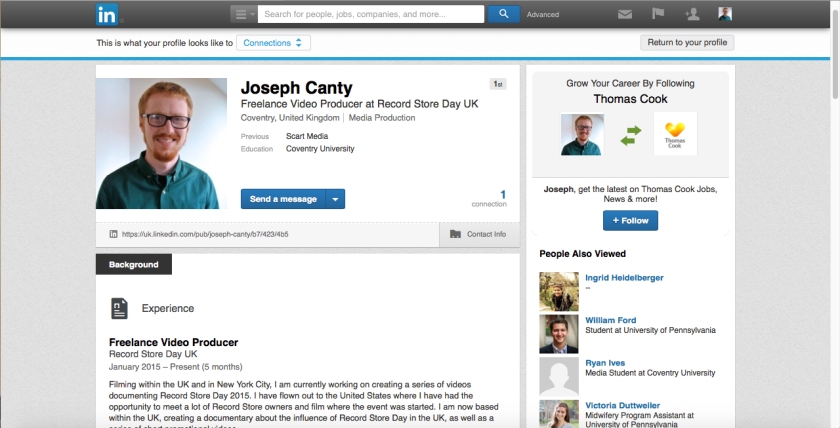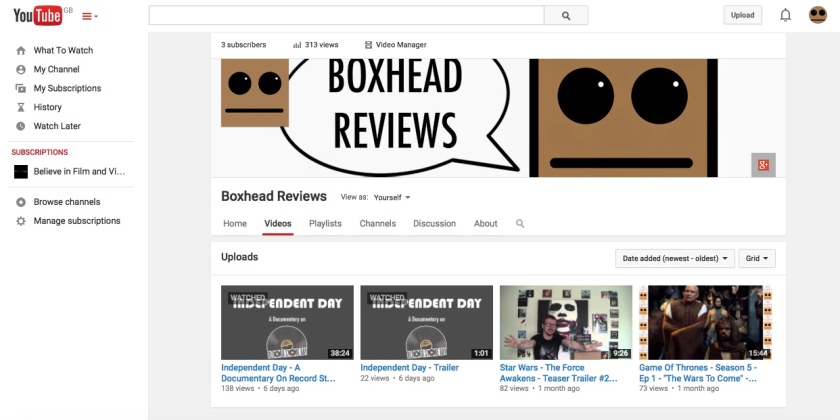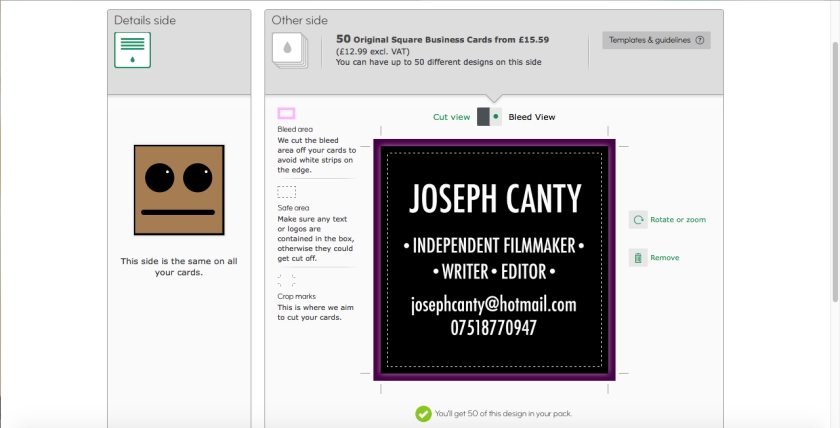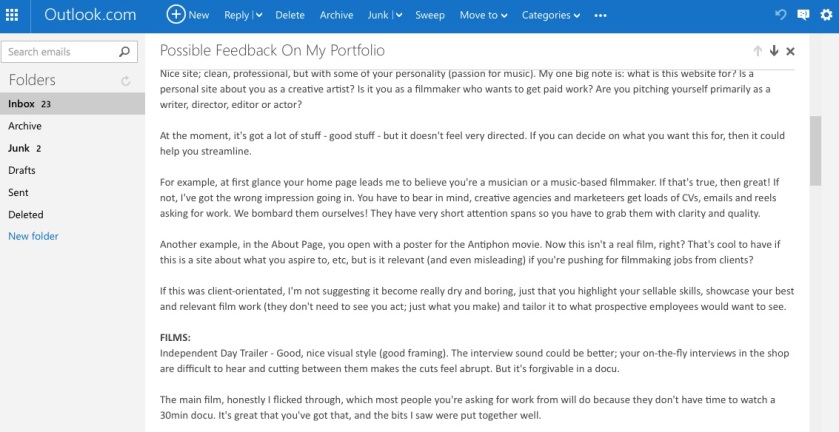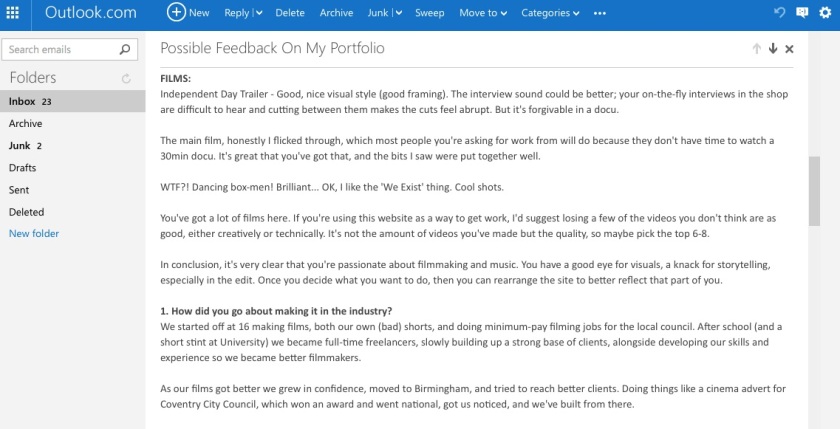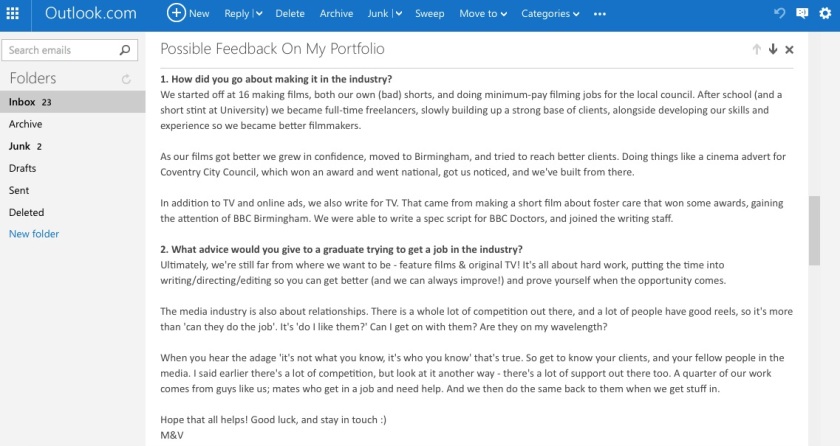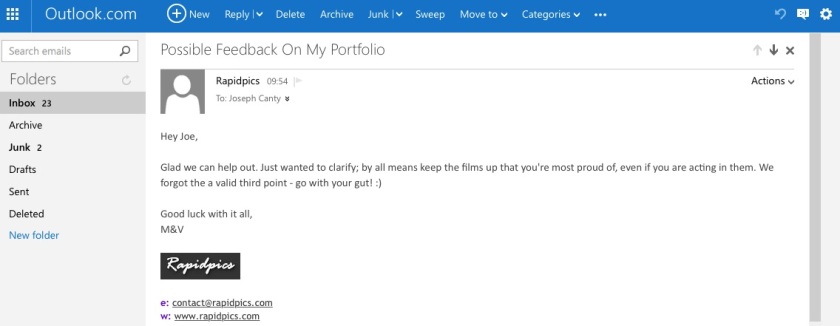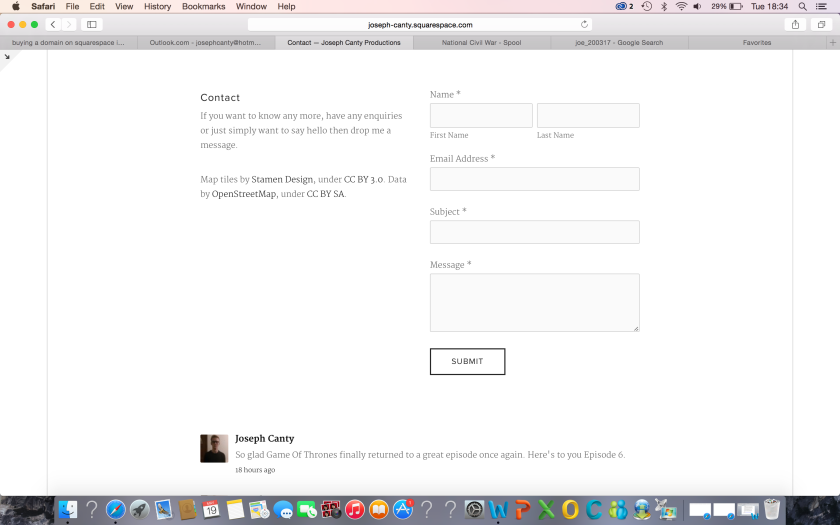Conclusion
Professional Practice Portfolio (364MC)Upon finishing University, like with most people I’m sure, my options are quite varied. These options are as follows:
Dawn has put me into contact with the Production Co-ordinator for Doctors, Stephen Capano, and she has suggested that I send him my CV on her recommendation. She has also stated that the production there is looking for a runner driver over the age of twenty-three and with a full clean drivers license.
Matt and Vince have also asked me to stay in contact with them once I have finished with University.
Upon working as an extra at the end of last summer, Jenn added me on Facebook to the Midlands Actors and Extras page. The day was so much fun and the amount of interesting people that I met in one day really surprised me. Since last summer, almost on a weekly basis, posts are being added to the page, and I feel that it is a good way of making contacts and getting used to the way the industry is run as well as being on a set.
Another option is Darryl, my Dad’s Godson, who has just recently become the Deputy News Editor at ITN for ITV News. I will most certainly be emailing Darryl in the next few days to see if he can recommend anything.
A final option is to get a job outside of the industry, say at Head Leamington where I filmed for Record Store Day for my FMP, and like some points from my research in my previous post, to “learn my craft” simultaneously. That is one of the most frequent terms that has popped up in the last couple months. So if I was to pursue the screenwriting path, I am almost advised not to attempt to juggle a chaotic life within the industry, whilst trying to learn and get my work out there. According to professionals, I am going to be working towards having any input whatsoever, in say the script of a television show for the next three to five years. So I think that it might be more beneficial for me to earn some money, working a job in the day, and then going to a scriptwriting course in the evenings, writing as much as I can in my spare time, and even possibly getting some radio experience at the same time along the way.
It is most certainly a transitional stage of my life, and one that is full of many questions, but one thing is for sure, wherever the next few months take me and whatever I end up doing, hard work, patience and a good cup of tea are all things necessary that I will most certainly need to offer!
Script Writing…. Ok Then, Let’s Do This
Professional Practice Portfolio (364MC)This post is fundamentally an amalgamation of as many of my favourite different examples that I have researched, to further my knowledge of starting out in the industry, skills that I need and the work ethic that is demanded of me, upon my path to become a successful scriptwriter. The list is varied from extracts, interviews, websites, videos, novels and even other examples of portfolios from those just a little further down the line than myself.
The Guardian – Wednesday 13 April 2011
An insider’s guide to becoming a screenwriter
If you have a stellar script in hand and are prepared to spend three to five years trying to get a break, you might have what it takes to be a screenwriter, says Stephen Davis.
You’ll be judged on the quality of your creative work, more than qualifications
The skill you develop in the process of gaining the qualification can be priceless. The qualification itself is very little use. Success post-graduation will be determined primarily by the quality of the creative work you generate. In some circumstances a qualification from a respected institution is seen as an indication of ability and can make a development exec, producer or agent more inclined to consider your submission. But whether they continuing reading beyond the first few pages has nothing to do with the qualification and everything to do with how much they like what they’re reading.
Build a network of trusted readers to critique your work
Basic screenwriting fundamentals can be learned through self-study and a few trips to the library. A screenwriting course is worth investing in only if it helps you develop the critical acumen you need in order to identify the weaknesses in your work and to invent solutions. Most writers also need a network of wise and trusted readers capable of giving constructive feedback on works-in-progress and a university or film centre can be a good place to make those connections.
Start sending your scripts out – but don’t expect to hear anything back first time
Start with BBC writersroom, the one place that welcomes unsolicited scripts and gives feedback on work that shows promise. Individual writers used to be able to apply directly to the UK Film Council for development funding but those funds are now distributed by the BFI which indicates a preference for submissions from writer-producer teams. To meet producers contact your regional screen agency; they should be aware of who is active in your area. Most importantly, expect none of this to work, at least the first time.
Managing rejection is a big part of the process but perseverance pays off. I had been in contact with Film Agency for Wales for more than two years with very little success but last October, after two script submissions and one unsuccessful application for development funding, they put me in touch with an independent producer who has since expressed interest in optioning one of my scripts.
Hollywood studios and production companies scour competitions for scripts
Part of the seductive appeal of screenwriting is the idea that you can go from a poverty-stricken unknown to a wealthy success story in the space of a weekend. It’s the equivalent of Fabio Capello seeing you play street football on Tuesday and handing you an England cap on Wednesday. Except occasionally it actually happens.
The good news for British writers is that Hollywood doesn’t really care where you live. If you’ve written a marketable high-concept script that jumps off the page and has an appealing role for a bankable movie star then you’ve got a chance of making a sale. But how do you get your script out there?
Screenplay contests offer genuine opportunities. Not all are worth the entry fee but some, like the Nicholl Fellowship, are well-established launch pads for new writers. Many Hollywood studios and production companies request to read not just the winning scripts but those that make the top ten or twenty in the major contests. In recent years websites such as InkTip have also developed services that help connect screenwriters with entertainment professionals looking for new material.
Taking a backroom job in the film industry to get your foot in the door isn’t necessary, but if you do choose waitressing as your back up career you must have a stellar script at the ready
Most emerging writers need a second (and sometimes third) job to pay the bills and it’s not essential that these jobs are within the film or television industry. In fact, an enjoyable non-film job that pays well and leaves you plenty of time to write might be more beneficial to your writing career than an energy-zapping position on the fringes of the entertainment industry. In the last three years I have worked in a variety of roles from a film producer’s assistant in Beverly Hills to a twilight shift shelf-stacker in a supermarket in North Wales. I don’t recommend the latter but the former won’t magically launch your writing career either.
Working for a producer – reading the Hollywood trade papers every day and writing coverage of screenplays being considered for production – gave me valuable insight into the development process but what mattered most was that I was writing in the evenings and on my days off. I made a lot of connections but generating interest in you as a writer is only useful if you have a really good writing sample to show people as soon as they are interested. If you meet a producer while selling her tickets at a film festival and she tells you to send her one of your scripts (it happened to me in Toronto) she doesn’t want to wait six months for you to finish something. Have a stellar script ready to send out while the person who asked for it still remembers who you are.
Be prepared to spend three to five years trying to get a break: you need self-belief verging on delusion
The most helpful career advice I’ve received came from a successful screenwriter who advised my class to give ourselves three to five years of trying to break into this industry before we even think about doing something else. That’s three to five years of probably not making much money, not getting on the property ladder, not having any job security. Certainly, there are many easier ways to make money than writing. It’s hard work that often requires levels of self-belief that verge on delusion. Opportunities have to be unearthed so search far and wide. In 2009, after a year of false starts in Wales, I was in danger of losing my enthusiasm so I moved to Toronto on a working holiday visa through BUNAC’s (a not-for-profit work abroad organisation) Work Canada programme. I had three part-time jobs (at a theatre organisation, a film festival, and a concert hall) but it was such a stimulating environment that I found myself writing more there than at any other point in my life.
Any other advice?
The cliche is true: the more your write the better you get. It’s never too early to start networking but make sure you have something to show people once they find out you’re a writer. Be mobile, don’t wait for opportunities to come to you. Get work experience and intern as much as you can afford to. Don’t be afraid of screwing up, mistakes are just “research” for writers. Spend at least a day on a film set. Get close enough to the actors and director to see how they work with the script. Practice your public speaking, most working writers have to pitch stories at some point. Listen to Jeff Goldsmith’s free podcasts for Creative Screenwriting magazine; these in-depth interviews with working writers are goldmines of screenwriting wisdom. Travel, it will show you that your normal isn’t the same as everyone else’s normal, and will free you to write from your own experience. Don’t just watch films, read screenplays. Remember that good stories are full of conflict and emotion. Most of all, write every day. Or at least know that you are competing with people who do.
Stephen Davis is a freelance screenwriter, administrative handyman, and a graduate of the American Film Institute in Los Angeles. To follow Stephen’s screenwriting adventures, you can also find him on Twitter.
National Careers Service
Work activities
Screenwriters create ideas and bring stories to life in scripts for feature films, TV comedy and drama, animation, children’s programmes and computer games.
As a screenwriter, you might develop your own original ideas and sell them to producers. Alternatively, producers may commission you to create a screenplay from an idea or true story, or to adapt an existing piece such as a novel, play or comic book.
Your work would typically involve:
- coming up with themes and ideas
- researching background material
- developing believable plots and characters
- laying out the screenplay to an agreed format
- preparing short summaries of your ideas and selling (known as ‘pitching’) them to producers or development executives
- getting feedback about the first draft of your work from producers or script editors
- rewriting the script if necessary (you may need to do this several times before arriving at the final agreed version).
You might also spend time networking with agents and producers, and handling your own tax and accounts. You would often combine writing with other work such as teaching, lecturing or editing.
Working hours and conditions
As a home-based freelance writer you would arrange your own working hours. If you were part of a studio-based writing team, you would be more likely to work standard office hours. In either case you would often have strict deadlines to meet.
As well as working from your home or office base, you would also need to attend occasional meetings with agents, script editors and producers.
Income
As a freelance writer, you or your agent would negotiate a fee for each piece of work. You might be partly paid in advance. Depending on your contract, you might also receive a percentage of the profits from a feature film.
See the Writers’ Guild of Great Britain website for recommended minimum pay rates for writers in film, TV and theatre.
Entry requirements
You will need imagination, writing talent and creativity rather than formal qualifications. However, when starting out you may find it useful to take a course that helps you develop your skills and understand dramatic structure.
Courses in creative writing and scriptwriting for all levels from beginner to advanced are widely available at colleges, adult education centres and universities.
Some screenwriters have degrees or postgraduate qualifications in creative writing, English or journalism, but this is not essential. You may have an advantage if you have writing and storytelling experience from another field such as journalism, advertising copywriting or acting.
You would normally start by coming up with your own screenplays and ideas, and trying to sell them to agents and producers. Once you have had some work accepted and started to build a professional reputation, producers might then commission you to produce scripts for them.
As a new writer, you could get yourself noticed by entering screenwriting competitions, which broadcasters and regional screen agencies sometimes hold to discover new talent. Contact Creative Skillset Careers for more information.
You can also find advice about submitting your work to the BBC at the BBC Writers’ Room website.
Training and development
Although there is no formal training path for screenwriters, your skills will grow with experience.
Joining a writers’ organisation could help you develop, as they can offer services such as script feedback, competitions, training and networking opportunities. Organisations include Euroscript and The Script Factory. Follow the links below to find out more about these organisations:
As an experienced screenwriter, you could choose to take an MA in Screenwriting. MAs are available full-time, part-time and by distance learning from several universities around the country.
You can search Creative Skillset’s website for industry approved screenwriting and script development training at all levels. Skillset can also advise you about funding your training as a freelance writer and any creative talent development training schemes which might be of interest.
Skills, interests and qualities
- excellent writing ability
- creativity and imagination
- storytelling skills and an understanding of dramatic structure
- self-discipline and motivation
- willingness to accept criticism and rejection of your work
- an organised approach to work, for meeting deadlines
- good presentation and networking skills, for marketing and promoting your work.
Opportunities
You would normally work freelance and be paid a fee for each piece accepted for production. You may also need to do other types of work to support yourself, as relatively few screenwriters earn a full-time living from writing.
Some opportunities may be advertised in the trade press and websites, but it is most common to find work by approaching producers yourself, by signing up with a writers’ agent, and through word of mouth.
You can find details of agents from The Writer’s Handbook and The Writers’ and Artists’ Year Book, which are available in bookshops and libraries.
You may also find the following useful for further reading and finding out about opportunities:
PACT Directory (contacts directory of TV/film production companies)
BBC Writers Room Interviews Paula Milne
“I became a script editor for the BBC and I just hated it. I hated the gossip and I just couldn’t fit in, but I loved the writers. They seemed to me to be drunk and late and interesting and I wanted to be like them. A while later I decided I wanted to try and write a soap opera, but back then there was only Coronation Street, so after many trials and sending many scripts, I eventually was accepted on the Street.
Upon writing Coronation Street it made me realise that I was funny and that you could use humor to reach an audience. You had to compete for scripts, in very very strenuous script meetings, so I learnt to stand my corner and argue, as I wanted a commission. You learnt to write to deadlines. You learnt an internal structure to scenes, as the actors expect to have pretty good lines. So as many good things that you pick up, you also learn a lot of bad habits, as you tend not to write the consequences of such events. It lives in it’s own little bubble, so I left.
You only get writers block if you haven’t done the thinking, and it’s not ready. So you have to think about the story, how the story is going to serve the theme, and how your characters are going to propel the story, and have a life of their own at the same time. The entry point I suppose I always try and think, have I seen it before? Start it really confidently, so that the audience immediately feels, in a well researched, authentic world, with something happening, and you jettison them into that world and they feel that they are in good hands and they trust you. Research is absolutely vital. In a sense you are writing for yourself, via discovering new cultures and interesting stories that people are curious about.
My advice to a new writer would be; keep going. You have to remember that you are engaging with an industry. And as you keep going you learn your craft, because there is a big craft side of it. Just don’t really give up. But you have to be honest with yourself, you have to really feel that you’ve got it, and really you have that found out by having your stuff performed, then you can look at it yourself and see.”
Top 10 Writing Tips by Marvel’s Avengers Writer/Director, Joss Whedon
“1. FINISH IT
Actually finishing it is what I’m gonna put in as step one. You may laugh at this, but it’s true. I have so many friends who have written two-thirds of a screenplay, and then re-written it for about three years. Finishing a screenplay is first of all truly difficult, and secondly really liberating. Even if it’s not perfect, even if you know you’re gonna have to go back into it, type to the end. You have to have a little closure.
2. STRUCTURE
Structure means knowing where you’re going; making sure you don’t meander about. Some great films have been made by meandering people, like Terrence Malick and Robert Altman, but it’s not as well done today and I don’t recommend it. I’m a structure nut. I actually make charts. Where are the jokes? The thrills? The romance? Who knows what, and when? You need these things to happen at the right times, and that’s what you build your structure around: the way you want your audience to feel. Charts, graphs, coloured pens, anything that means you don’t go in blind is useful.
3. HAVE SOMETHING TO SAY
This really should be number one. Even if you’re writing a Die Hard rip-off, have something to say about Die Hard rip-offs. The number of movies that are not about what they purport to be about is staggering. It’s rare, especially in genres, to find a movie with an idea and not just, ‘This’ll lead to many fine set-pieces’. The Island evolves into a car-chase movie, and the moments of joy are when they have clone moments and you say, ‘What does it feel like to be those guys?’
4. EVERYBODY HAS A REASON TO LIVE
Everybody has a perspective. Everybody in your scene, including the thug flanking your bad guy, has a reason. They have their own voice, their own identity, their own history. If anyone speaks in such a way that they’re just setting up the next person’s lines, then you don’t get dialogue: you get soundbites. Not everybody has to be funny; not everybody has to be cute; not everybody has to be delightful, and not everybody has to speak, but if you don’t know who everybody is and why they’re there, why they’re feeling what they’re feeling and why they’re doing what they’re doing, then you’re in trouble.
5. CUT WHAT YOU LOVE
Here’s one trick that I learned early on. If something isn’t working, if you have a story that you’ve built and it’s blocked and you can’t figure it out, take your favourite scene, or your very best idea or set-piece, and cut it. It’s brutal, but sometimes inevitable. That thing may find its way back in, but cutting it is usually an enormously freeing exercise.
6. LISTEN
When I’ve been hired as a script doctor, it’s usually because someone else can’t get it through to the next level. It’s true that writers are replaced when executives don’t know what else to do, and that’s terrible, but the fact of the matter is that for most of the screenplays I’ve worked on, I’ve been needed, whether or not I’ve been allowed to do anything good. Often someone’s just got locked, they’ve ossified, they’re so stuck in their heads that they can’t see the people around them. It’s very important to know when to stick to your guns, but it’s also very important to listen to absolutely everybody. The stupidest person in the room might have the best idea.
7. TRACK THE AUDIENCE MOOD
You have one goal: to connect with your audience. Therefore, you must track what your audience is feeling at all times. One of the biggest problems I face when watching other people’s movies is I’ll say, ‘This part confuses me’, or whatever, and they’ll say, ‘What I’m intending to say is this’, and they’ll go on about their intentions. None of this has anything to do with my experience as an audience member. Think in terms of what audiences think. They go to the theatre, and they either notice that their butts are numb, or they don’t. If you’re doing your job right, they don’t. People think of studio test screenings as terrible, and that’s because a lot of studios are pretty stupid about it. They panic and re-shoot, or they go, ‘Gee, Brazil can’t have an unhappy ending,’ and that’s the horror story. But it can make a lot of sense.
8. WRITE LIKE A MOVIE
Write the movie as much as you can. If something is lush and extensive, you can describe it glowingly; if something isn’t that important, just get past it tersely. Let the read feel like the movie; it does a lot of the work for you, for the director, and for the executives who go, ‘What will this be like when we put it on its feet?’
9. DON’T LISTEN
Having given the advice about listening, I have to give the opposite advice, because ultimately the best work comes when somebody’s fucked the system; done the unexpected and let their own personal voice into the machine that is moviemaking. Choose your battles. You wouldn’t get Paul Thomas Anderson, or Wes Anderson, or any of these guys if all moviemaking was completely cookie-cutter. But the process drives you in that direction; it’s a homogenising process, and you have to fight that a bit. There was a point while we were making Firefly when I asked the network not to pick it up: they’d started talking about a different show.
10. DON’T SELL OUT
The first penny I ever earned, I saved. Then I made sure that I never had to take a job just because I needed to. I still needed jobs of course, but I was able to take ones that I loved. When I say that includes Waterworld, people scratch their heads, but it’s a wonderful idea for a movie. Anything can be good. Even Last Action Hero could’ve been good. There’s an idea somewhere in almost any movie: if you can find something that you love, then you can do it. If you can’t, it doesn’t matter how skilful you are: that’s called whoring.”
Further Useful Links
Website Improvements
Professional Practice Portfolio (364MC)One of the key points from Matt and Vince’s feedback was to make my front page of the website clear as to the direction I wanted to follow. Having the Record Store Day poster and the music quote led more to the appearance of a musicians website then a filmmakers website. One of the first things I wanted to do then was to create a static welcome banner for my site that kept with the same aesthetic but suggested filmmaker rather than music lover. Here is what the banner image looks like now…
I have also altered a few other sections of my website. The main of these being the portfolio page. Before I had around twenty pieces on my site that didn’t really fit together. So after a lot of watching and re-watching I have been quite brutal and narrowed my pieces down to nine. I have really tried to make the pieces compliment each other and show the skills I want to be noticed. One of the areas I am looking into is script writing so I had to show I am full on exciting and original ideas so keeping strong concept pieces in does this well. As it is a page where you scroll down through the pieces I have obviously put the strongest pieces towards the top as they are the most likely to be viewed.
Social Networking
Professional Practice Portfolio (364MC)One of the main ways to communicate with other creatives and to get yourself out there is through social networking. It seems to be now the biggest and best way to make a name for yourself with no cost. I have used Twitter for years and have built up a loyal fan base. On Twitter I share reviews on music and film and do a ‘Song 4 The Day’ everyday that seems to go down well. I wanted to extend my social networking presence as part of the project so looked at the best options for me.
One of the sites I wasn’t keen on using was Facebook. I know in the past it was the in thing to create a page that people could like and follow. However, I now feel this is slightly outdated. There are far more popular sites now for sharing videos and portfolio updates that I feel are far stronger and possibly more professional.
The first thing I created was a Linked In account. I feel for anyone, not just creatives, this is vital for connecting with a tonne of professionals.
Another site I felt was worth while joining was Instagram. I know that it isn’t a site for films/documentaries, however, it is one of the quickest and easiest ways of connecting to creatives all over the world. You can share fifteen seconds worth of footage or images and it is a great source of inspiration for anyone with a creative bone in their body. I know people who have built up a client base purely from using the site and it’s also a place where people offer a lot of advice and feedback.
Another area I wanted to promote myself on was YouTube. I know most filmmakers have a youtube account to showcase their pieces, this is something I would rather use Vimeo for, I want to use my YouTube channel for a review show. Review shows are massive right now and people don’t just follow the one channel to hear how good the latest film, show or album is, they like to have a variety of opinions. I love both film and music, as well as the odd big TV show and enjoy discussing them with people even more. My friends have often come to me over the years for my recommendations in music and often they have joked about me doing my own review show. Well now I am actually taking the joke seriously and want to create posts, at least twice a week, that review film releases, new trailers, new album or song releases as well as what I think about the latest episode of some of the world’s biggest TV shows. I believe if I commit myself to it enough, I could end up with quite a selection of followers.
Festivals For Submitting My Final Major Project
Professional Practice Portfolio (364MC)Although I am predominantly planning to pursue this after finishing University, I thought I could include a brief post about it here. If I was content with my FMP I would submit it to a number of different film festivals in the UK, as I feel it is a very useful way of getting my work out in the wide world and also a good opportunity for me to create contacts. Here are a number of different festivals that I am looking to submit my work to in the coming months:
- BFI London Film Festival – Entry £15 Before 12th June – Festival Takes Place Between 7th – 18th October
- Raindance Festival – (London) – Entry £50 Before 22nd June – £80 Before 29th June – Festival Takes Place Between 23rd September – 4th October
- British Urban Film Festival – (London) – Entry £75 Before 29th June – Festival Takes Place 17th September
- The London Short Film Festival – Entry £15 Before 14th July – Festival Takes Place Between 9th – 18th January 2016
- Cornwall Film Festival – Entry £15 Before 3rd August – Festival Takes Place Between 14th September – 30th November
- London Independent Film Festival – Entry £50 Before 6th November – Festival Takes Place Between 14th – 25th April 2016
Promotional Material
Professional Practice Portfolio (364MC)One of the key things I have found when I have researched getting into the industry tips and the advice I have been given from professionals, as well as other creatives, is the need to stand out. You have around 30 seconds to impress someone, so you need to make sure you stand out for all the right reasons. Obviously my portfolio needs to speak for itself and make potential employers want to continue looking through, but it seems vitally important to promote yourself in a way that is different and attention grabbing. With the help of a graphic designer friend, I set about designing a range of promotional material that might help me stand out from the crowd.
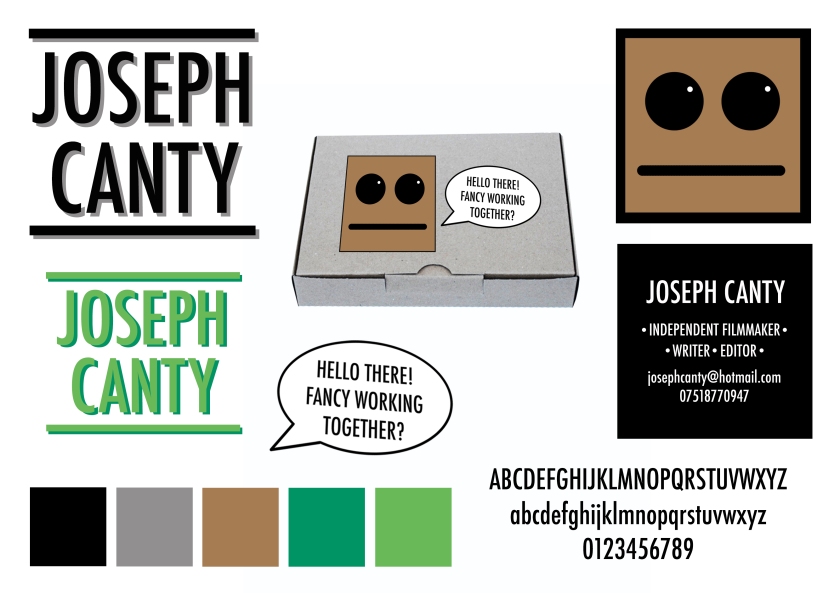
I started by creating a branding sheet. I knew I wanted to use the image of the box head that I used in one of my original FMP ideas to act as a logo for myself. Not only is it something quirky but it also fits with the term box head meaning someone addicted to film and tv. From this I picked a colour scheme and font which helped to build up some original ideas.
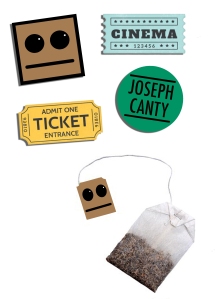 In order to attract attention to my portfolio I aim on sending out promotional packs to possible employers. This will include the usual business card, contact information and showreel CD. It can also include novelty items such as sweets, tea bags (everyone loves a free cuppa), toys, stickers etc.
In order to attract attention to my portfolio I aim on sending out promotional packs to possible employers. This will include the usual business card, contact information and showreel CD. It can also include novelty items such as sweets, tea bags (everyone loves a free cuppa), toys, stickers etc.
I have sent my business cards to print so fingers crossed they will arrive in time for the degree show. I wanted to go for something a little different, so when looking at printers I discovered getting my business card printed in a square shape over the traditional rectangle. This ended itself perfectly to the shape of my box head so obviously the two had to go hand in hand.
Portfolio Website Feedback and Advice On Entering the Industry.
Professional Practice Portfolio (364MC)As part of this brief, I sent out emails to the contact list I have put together in aim of getting feedback on my online portfolio and asking them for advice on getting into the industry. I had email Matt and Vince, who are freelance video producers that I met when I was in college. I have remained in contact with them since then and they are very supportive of my work. Most of the responses I have received back I have worked into other blog posts, however, I felt this response needed a post of its own due to how useful it has proven to be…
“Hi Joe,
Got some feedback here. If any of it sounds harsh, it isn’t – it’s all said with respect and appreciation for your obvious talent and determination 🙂 We just want to be honest so you get the best from us.
THE WEBSITE:
Nice site; clean, professional, but with some of your personality (passion for music). My one big note is: what is this website for? Is a personal site about you as a creative artist? Is it you as a filmmaker who wants to get paid work? Are you pitching yourself primarily as a writer, director, editor or actor?
At the moment, it’s got a lot of stuff – good stuff – but it doesn’t feel very directed. If you can decide on what you want this for, then it could help you streamline.
For example, at first glance your home page leads me to believe you’re a musician or a music-based filmmaker. If that’s true, then great! If not, I’ve got the wrong impression going in. You have to bear in mind, creative agencies and marketeers get loads of CVs, emails and reels asking for work. We bombard them ourselves! They have very short attention spans so you have to grab them with clarity and quality.
Another example, in the About Page, you open with a poster for the Antiphon movie. Now this isn’t a real film, right? That’s cool to have if this is a site about what you aspire to, etc, but is it relevant (and even misleading) if you’re pushing for filmmaking jobs from clients?
If this was client-orientated, I’m not suggesting it become really dry and boring, just that you highlight your sellable skills, showcase your best and relevant film work (they don’t need to see you act; just what you make) and tailor it to what prospective employees would want to see.
FILMS:
Independent Day Trailer – Good, nice visual style (good framing). The interview sound could be better; your on-the-fly interviews in the shop are difficult to hear and cutting between them makes the cuts feel abrupt. But it’s forgivable in a docu.
The main film, honestly I flicked through, which most people you’re asking for work from will do because they don’t have time to watch a 30min docu. It’s great that you’ve got that, and the bits I saw were put together well.
WTF?! Dancing box-men! Brilliant… OK, I like the ‘We Exist’ thing. Cool shots.
You’ve got a lot of films here. If you’re using this website as a way to get work, I’d suggest losing a few of the videos you don’t think are as good, either creatively or technically. It’s not the amount of videos you’ve made but the quality, so maybe pick the top 6-8.
In conclusion, it’s very clear that you’re passionate about filmmaking and music. You have a good eye for visuals, a knack for storytelling, especially in the edit. Once you decide what you want to do, then you can rearrange the site to better reflect that part of you.
1. How did you go about making it in the industry?
We started off at 16 making films, both our own (bad) shorts, and doing minimum-pay filming jobs for the local council. After school (and a short stint at University) we became full-time freelancers, slowly building up a strong base of clients, alongside developing our skills and experience so we became better filmmakers.
As our films got better we grew in confidence, moved to Birmingham, and tried to reach better clients. Doing things like a cinema advert for Coventry City Council, which won an award and went national, got us noticed, and we’ve built from there.
In addition to TV and online ads, we also write for TV. That came from making a short film about foster care that won some awards, gaining the attention of BBC Birmingham. We were able to write a spec script for BBC Doctors, and joined the writing staff.
2. What advice would you give to a graduate trying to get a job in the industry?
Ultimately, we’re still far from where we want to be – feature films & original TV! It’s all about hard work, putting the time into writing/directing/editing so you can get better (and we can always improve!) and prove yourself when the opportunity comes.
The media industry is also about relationships. There is a whole lot of competition out there, and a lot of people have good reels, so it’s more than ‘can they do the job’. It’s ‘do I like them?’ Can I get on with them? Are they on my wavelength?
When you hear the adage ‘it’s not what you know, it’s who you know’ that’s true. So get to know your clients, and your fellow people in the media. I said earlier there’s a lot of competition, but look at it another way – there’s a lot of support out there too. A quarter of our work comes from guys like us; mates who get in a job and need help. And we then do the same back to them when we get stuff in.
Hope that all helps! Good luck, and stay in touch 🙂
M&V”
Portfolio
Professional Practice Portfolio (364MC)For the end of university I have created a portfolio website using square space. I wanted a very clean cut, professional site that showcases the best of my work. I heard of the site square space during a podcast for the Oscars. As someone who has no clue when it comes to making websites, I needed a site that took the coding part away so I could just focus on building a professional site. Square space seemed to be the best fit as it was simple enough to build and had all the features I hoped I could include.
https://joseph-canty.squarespace.com
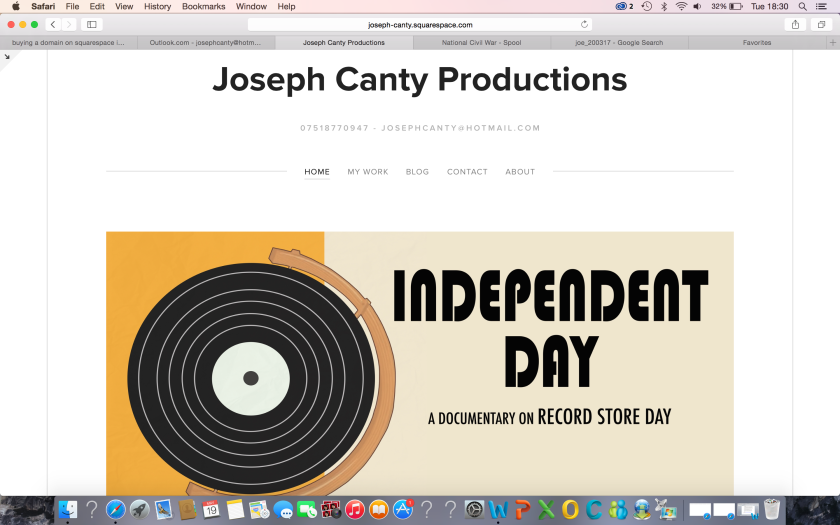
The site has a homepage which will include a feature piece as the artwork for the page. This may be my latest piece or something that is appropriate at the time. This section will be update regularly to keep it interesting and appear like the website is being updates. This homepage then includes the usual links and a small piece of information about me towards the bottom. It also includes links to my social media pages.
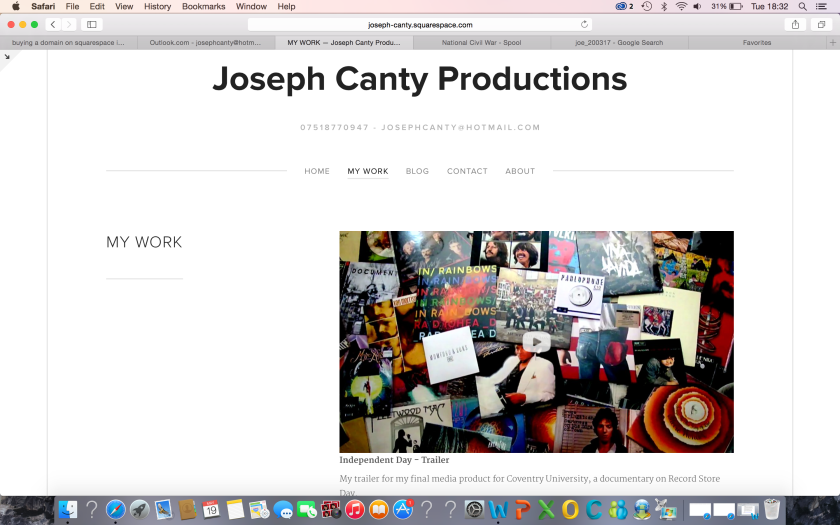
The ‘My Work’ page is the most crucial part of the site. Viewers can click the link in the navigation bar to get to it or click the link at the bottom of the homepage (I wanted multiple links so no once could miss it and to signify its importance). The page includes 20 pieces of mine that showcase a range of skills I have. I have arranged them into skills and quality over dates so the most important pieces are seen first.
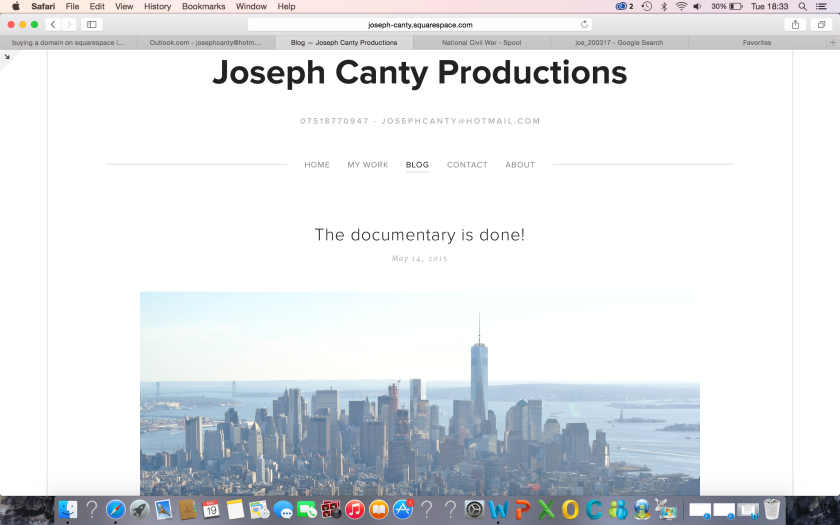
There is also a blog feature to this page. From researching into what makes a successful portfolio website, it is often said that a page, such as a blog, is in place so regular updates can be made. People like to know a site is current and therefore, people often follow it and come back to it. This is a way to link in smaller projects that wouldn’t necessarily feature in my portfolio of work but are still out there for people to view.
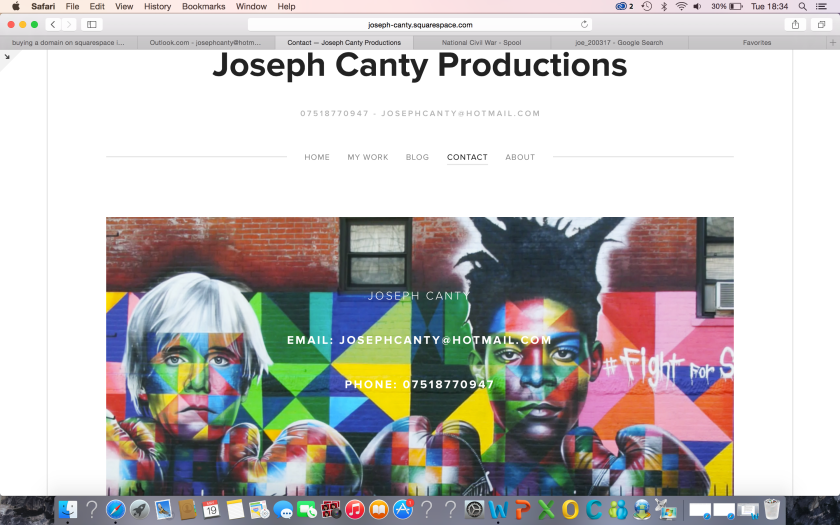
A contact page is obviously a major thing to include. I have built mine so people can chose to take my email and contact me directly or they can choose to send a message through the boxes provided that gets sent to my email account. I have also provided a contact number and links to my twitter account which is a great way for people to get in contact quickly any time of the day.
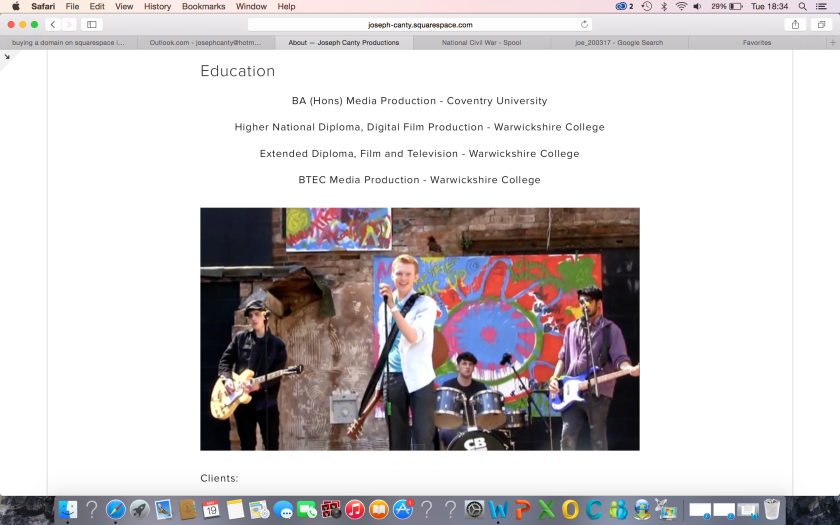
Finally I have an ‘About Me’ page. This includes a brief paragraph about myself, my aesthetic, my inspiration etc. It also includes my education and clients I have worked with.
After building the website I sent the link across to some of the contacts I have made to ask their opinion on it and if there was anything I could work on to make it stronger. Here are some of the responses I got…
“Yes, it all looks very smart and professional, with a theme that matches your fmp at uni. You’ve also got everything nice and organised on the work page for viewing. I had a watch through the vinyl doc, which all looked good.”
– Dan Beckett
Freelance: A guide to getting started.
Professional Practice Portfolio (364MC)As there is a strong possibility that I could go freelance in the future, not necessarily now but at some point in my career, I thought I would put together a guide, with the help of my girlfriend who also posted about going freelance on her blog, to getting started as a freelancer.
“DO GOOD WORK AND SHOW THE RIGHT PEOPLE”
1. Start by asking what you want to achieve. Something that most don’t do; it creates guidance, motivation, focus and confidence.
2. Recognise your target audience. Research the field you aim to get in. You need to be completely clear on what type of individual you are. Once you have done this, look into the type of work out there for you and tailor how you market you work to suit this.
3. Be open minded. Be open to other areas of work and opportunities. You never know…you may have a hidden talent.
4. Contacts. Build a comprehensive database of contacts, this can be sourced by yourself or you can buy a ready made list (warning: these can be expensive though) Once you have a list of contacts, constantly refine these. You want them to be as up to date as possible.
5. Cost vs Return. Set a yearly promo budget; looking around 15% of your income should be spent on this. You want it to be as professional as possible. Consider the volume of marketing needed to see a return. You are unfortunately looking at around a 3% response rate. In addition, consider your cash flow and when the marketing is needed. You don’t want to waste money you don’t have. Plan your costs out carefully and set goals.
“LOOK AT WHAT OTHERS ARE DOING”
– Constantly trail other filmmaker’s sites. Research how they are promoting themselves, what they are doing and who they are working for.
– Email other filmmakers similar to yourself and ask for advice. No one is going to be able to help you more than those who have already been through it.
– Read, read and read. Find as many books you can about art, business, marketing, education and learn as much as possible. It will come in handy.
Books to get your hands on…
‘How To Create A Portfolio And Get Hired‘ by Fig Taylor
‘Marketing The Arts‘ by Dara O’Riley and Fiona Kerrigan
“EXPRESS YOURSELF”
1. Design a strong logo and stationary that represents you. Keep it consistent/ constant. Pick a theme and stick to it. Your Style = Your Brand.
2. Have a good portfolio. Include client relevant, published and personal pieces. Best images at the start and the end (max 20 pieces) and always take something that they can keep. Business cards, postcards stickers or badges are great things to leave behind so they don’t forget you. Most importantly…always pick you BEST pieces. Don’t show work that you aren’t proud of.
3. Direct Mail potential clients. Be creative. Make up little packs to send out. Things that are useful to your client as always good to send out. People will always use pens and notepads. How about also including tea bags or snacks for their desk in your branding? Produce something they will want to keep or use! Get your potential clients name and job titles correct, consider presentation, think about the size and make sure your contact details are correct.
Possible promo items…
Brochures, Business Cards, Postcards, Catalogues, Bags, Key Rings, Coasters, Promo Packs, Badges, Stickers, DVDs, Videos, Letters, Email Blasts, Blogs, Websites.
